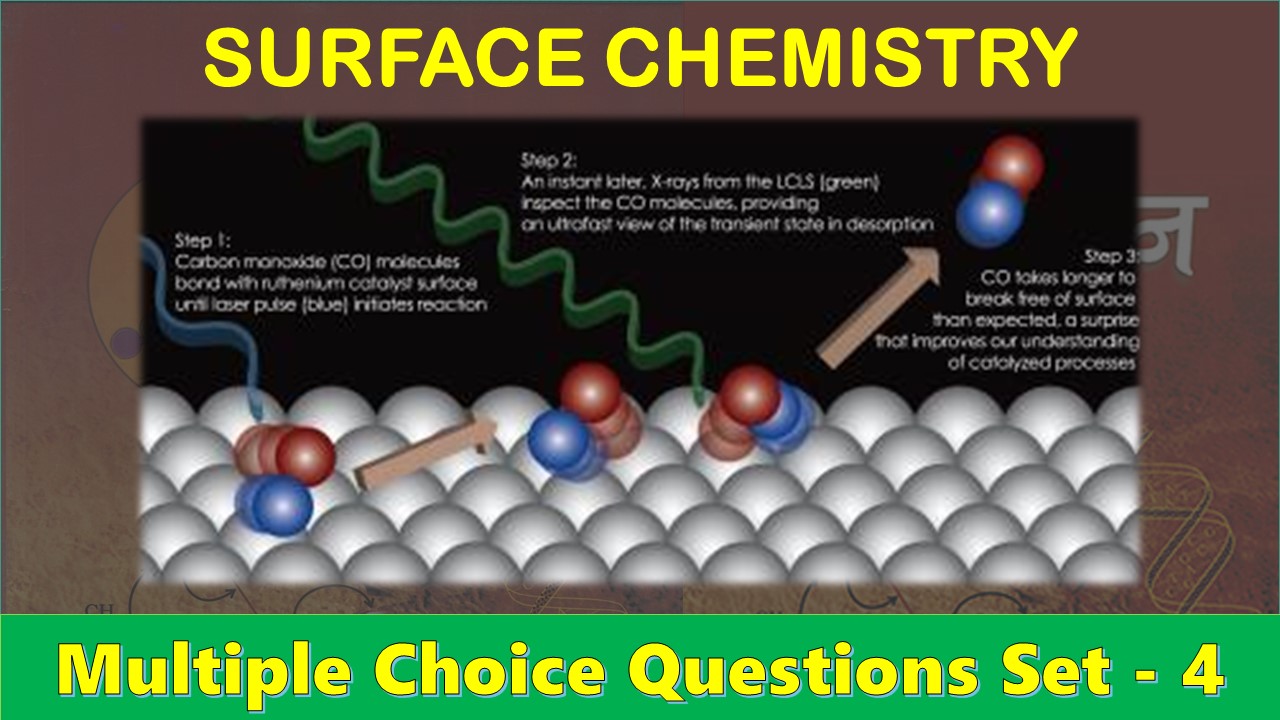CBSE Class 12 Surface Chemistry Multiple Choice Questions with Answers. MCQ Questions Class 12 Surface Chemistry with Answers Is Prepared Based on Latest Exam Pattern. Students can solve NCERT Class 12 Surface Chemistry MCQs with Answers to know their preparation level.
Students who are searching for NCERT MCQ Questions for Class 12 Surface Chemistry with Answers are compiled here to get good practice on all fundamentals. Know your preparation level on MCQ Questions for Class 12 Surface Chemistry with Answers. You can also verify your answers from our provided MCQ Class 12 Surface Chemistry with Answers. So, ace up your preparation with MCQ of Class 12 Chemistry Examinations.
MCQ Questions Class 12 Surface Chemistry with Answers - Set - 4
Question 1:
Which one of the following impurities present in colloidal solution cannot be removed by electrodialysis?
(a) Sodium chloride
(b) Potassium sulphate
(c) Urea
(d) Calcium chlorid
Correct Answer – (C)
Question 2 :
Gold numbers of protective colloids A, B, C and D are 0.50, 0.01, 0.10 and 0.005, respectively. The correct order of their protective powers is
(a) D < A < C < B
(b) C < B < D < A
(c) A < C < B < D
(d) B < D < A < C
Correct Answer – (C)
Question 3 :
A colloidal solution is subjected to an electrical field. The particles move towards anode. The coagulation of same sol is studied using NaCl, BaCl2 and AlCl3 solutions. Their coagulating power should be
(a) NaCl > BaCl2 > AlCl3
(b) BaCl2 > AlCl3 > NaCl
(c) AlCl3 > BaCl2 > NaCl
(d) BaCl2 > NaCl > AlCl3
Correct Answer – (C)
Question 4 :
When a few typical solutes are separated by a particular selective membrane such as protein particles, blood corpuscles, this process is called
(a) transpiration
(b) endosmosis
(c) dialysis
(d) diffusion
Correct Answer – (C)
Question 5 :
At the critical micelle concentration (CMC) the surfactant molecules
(a) associate
(b) dissociate
(c) decompose
(d) become completely soluble.
Correct Answer – (A)
MCQ Questions Class 12 Surface Chemistry with Answers
Question 6:
The disease kala azar is caused by
(a) colloidal antimony
(b) milk of magnesia
(c) argyrols
(d) colloidal gold
Correct Answer – (A)
Question 7:
Under the influence of an electric field, the particles in a sol migrate towards cathode. The coagulation of the same sol is studied using NaCl, Na2SO4 and Na3PO4 solutions. Their coagulating values will be in the order
(a) NaCl > Na2SO4 > Na3PO4
(b) Na2SO4 > Na3PO4 > NaCl
(c) Na3PO4 > Na2SO4 > NaCl
(d) Na2SO4 > NaCl > Na3PO4
Correct Answer – (A)
Question 8:
Preparation of Lyophobic sols by chemical method involves
(a) double decomposition
(b) oxidation & reduction
(c) hydrolysis
(d) all of these
Correct Answer – (D)
Question 9:
The ability of anion, to bring about coagulation of a given colloid, depends upon
(a) magnitude of the charge
(b) both magnitude and charge
(c) its charge only
(d) sign of the charge alone.
Correct Answer – (B)
Question 10:
Which one of the following method is commonly used method for destruction of colloid?
(a) Dialysis
(b) Condensation
(c) Filteration by animal membrane
(d) By adding electrolyte
Correct Answer – (D)
- NCERT Solutions Class 11 Chemistry Chapter 1 : Some Basic Concepts of Chemistry
- NCERT Solutions Class 11 Chemistry Chapter 2 : Structure Of The Atom
- NCERT Solutions Class 11 Chemistry Chapter 3 : Classification of Elements and Periodicity in Properties
- NCERT Solutions Class 11 Chemistry Chapter 4 : Chemical Bonding and Molecular Structure
- NCERT Solutions Class 11 Chemistry Chapter 5 : States of Matter
- NCERT Solutions Class 11 Chemistry Chapter 6 : Thermodynamics
- NCERT Solutions Class 11 Chemistry Chapter 7 : Equilibrium
- NCERT Solutions Class 11 Chemistry Chapter 8 : Redox Reactions
- NCERT Solutions Class 11 Chemistry Chapter 9 : Hydrogen
- NCERT Solutions Class 11 Chemistry Chapter 10 : The s-Block Elements
- NCERT Solutions Class 11 Chemistry Chapter 11 : The p-Block Elements
- NCERT Solutions Class 11 Chemistry Chapter 12 : Organic Chemistry: Some Basic Principles and Techniques
- NCERT Solutions Class 11 Chemistry Chapter 13 : Hydrocarbons
- NCERT Solutions Class 11 Chemistry Chapter 14 : Environmental Chemistry



